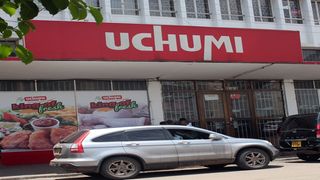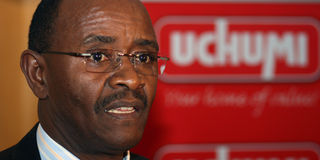
The Uchumi branch along Koinange Street in Nairobi in March 2018.
| Dennis Onsongo | Nation Media GroupPremium
From Kirubi to Ciano, Uchumi was a sinking ship
What you need to know:
- The supplier roll had not been verified.
- The number of goods claimed to have been supplied differed from what was on the shelves.
CEO Jonathan Ciano’s wife was among Uchumi’s top suppliers and she was paid in full and on time despite inflating costs.
Businessman Chris Kirubi was believed to have the Midas touch. As a man who had built several successful companies, his entry into Uchumi Supermarket as a major shareholder was expected to infuse the kind of ingenuity required to turn around a sinking ship.
On December 13, 2001, the Industrial and Commercial Development Corporation (ICDC) seconded Mr Kirubi to chair the Uchumi Board of Directors.
The government had divested its stake in ICDC and Mr Kirubi was among the tycoons who bought into the investment firm.
He knew – or thought – Uchumi was a good venture and would acquire about five per cent of its shares by 2005.
During Mr Kirubi’s tenure as Uchumi board chairman, an expansionist drive pushed the company off the rails. It was the first time payment to suppliers was delayed and the share price started to fall.
In the annual reports, Mr Kirubi blamed the near collapse of Uchumi on the expansion plan.
While the expansion saw gross profit improve from Sh1.224 billion in 2001 to Sh1.373 billion in 2002, it was all wiped out by increased operating costs, especially on the six new branches.

The late Chris Kirubi.
The operating profit for 2002 decreased from Sh118.5 million to Sh83.2 million, according to Mr Kirubi in the 2002 annual report.
Uchumi was in deep trouble by 2004. The retailer had taken short-term loans amounting to Sh3.6 billion between 1997 and 2004 to fund its expansion.
Some of the new branches were opened without a business plan or feasibility studies, and soon the expected foot traffic dried up.
At the same time, poor management meant no money was being raised internally, employees were stealing from the firm, which was also guilty of buying stock that was difficult to move.
The retailer had also formed a subsidiary, Kasarani Mall Ltd, and given it a Sh109 million loan to buy 20 acres from Solio Construction, a firm owned by former President Daniel arap Moi and his associate Joshua Kulei. As it later emerged, the land had been given to the military.
The piece of land is still is riddled with complex ownership issues. It was Uchumi’s hope for its revival.
What sank the retailer, however, was a decision by Mr Kirubi’s team to request shareholders for funds through a rights issue in 2005.
A rights issue is the sale of new shares to existing shareholders in a bid to raise money.
A lie
The firm lied to clueless investors that the money raised would go into the expansion of Uchumi. Interestingly, Mr Kirubi and ICDC sold their Uchumi shares during the rights issue.
The Sh1.2 billion raised was channelled to the loss-making Uganda and Tanzania branches. The decision made Uchumi bankrupt as the rights issue increased the number of shareholders to 12,000 from 8,000.
By this time, KCB and PTA banks were still owed Sh891 million while suppliers had not been paid more than Sh1.8 billion.
One of the company’s prime assets, the building that hosted Uchumi Aga Khan Walk in Nairobi, was sold to Allgate Ltd for Sh147 million in a desperate attempt to raise cash and hide losses. Allgate then leased the premises back to Uchumi for Sh1.7 million per month, piling more expenses.
It later turned out that the building may have been worth more than three times the sale price.
In June 2005, Mr Kirubi resigned from Uchumi. He left South African retail guru John Masterten-Smith deal with the murk.

John Masterten-Smith as Uchumi Supermarket CEO.
By this time, Mwai Kibaki was the president and his administration hoped to revitalise the retailer, a task given to Trade Minister Mukhisa Kituyi.
An audit had shown that poor record keeping had aided theft by workers and managers. It was unlikely that evidence would be gathered to implicate anyone for the collapse.
For instance, no verifying of supplier registers had been done. The number of goods claimed to have been supplied differed from the quantity in Uchumi’s possession. Books had been cooked and the inventory department corrupted. In one instance, the audit said Uchumi imported Sh70 million greeting cards, which were not moving off the shelves.
So tricky was running this retail chain that Mr Masterten-Smith gave up on fixing the mess and suspended Uchumi’s operations on June 1, 2006.
After that KCB and PTA banks placed Uchumi under receivership, while the NSE suspended trading of Uchumi shares.
During Uchumi’s 2006 AGM, Mr Masterten-Smith admitted that theft of stock by employees and non-payment of suppliers had driven the retailer down. He, however, added that past managers would not be pursued for their misdeeds.
2006 closure
Finally, Uchumi closed its doors in June 2006, threatening the livelihoods of shareholders, most of whom were small-scale investors.
The fear then was that creditors and banks would sell Uchumi’s assets. That week, Dr Kituyi called representatives of the creditors and suppliers, telling them that the government was committed to reviving Uchumi.
As Trade Permanent Secretary David Nalo continued calming suppliers, the headache was how to raise at least Sh680 million to address the demands of creditors.
Jonathan Ciano had been picked to lead the revival efforts.
Dr Kituyi convinced President Kibaki that it was worth trying to revive Uchumi. Some Cabinet ministers thought it was not worth it.
For five years, Uchumi rose from the ashes. With a Sh675 million loan, Uchumi paid part of its debt to PTA and KCB, while the balance was converted into equity.
In 2018, Mr Kirubi appeared in court alongside former MD Kennedy Thairu, former directors Francis Oyugi, Joseph Munene, Kezzy Muniu, Nigel Pavitt and Isaac Awuondo. Others were Amin Manji and Shamash Manji, then acting MD Lloyd Masika, Stephen Waruhiu, Allgate MD Atul Shah and Deepak Shah.

Chris Kirubi, Francis Oyugi (middle) and Joseph Munene (left) in court in 2008 charged with conspiring to defraud Uchumi.
They were accused of colluding to defraud Uchumi by selling the Aga Khan Walk land for a song.
The case dragged in court until 2011, when the 13 were freed.
In 2010, Uchumi was officially out of receivership and acting CEO Ciano was confirmed the new boss.
It appeared Uchumi was back on track and investors regained confidence in the revival.
A 2014 rights issue raised Sh900 million and some suppliers agreed to continue providing goods to Uchumi.
A year after the rights issue, Mr Ciano was dismissed for gross misconduct after it emerged that Uchumi was still not paying suppliers. It was also making losses.
An audit was ordered and a bigger mess than the 2001-5 one was discovered. Mr Ciano’s chief of staff was accused of keeping two sets of books to conceal the hole Uchumi was in.
While the retailer reported a Sh501 million loss to December 2014, the real figure was Sh1.9 billion.
A Sh1.6 billion deal with RentCo East Africa was also kept hidden. Uchumi had sold some of its assets to RentCo and was leasing them back at prices that were burning a hole through the retailer’s pockets.

Jonathan Ciano as Uchumi Supermarket CEO in 2011.
As for the 2014 rights issue, investors had been duped again. Mr Ciano’s team earmarked the Sh900 million for operating costs but used most of the funds to pay suppliers. Uchumi was actually robbing Peter to pay Paul.
The procurement department had people who did not meet the minimum requirements for the job. Mr Ciano’s wife was among Uchumi’s top suppliers.
She was paid in full and on time despite inflating costs.
Creditors sought the intervention of the court in winding up Uchumi in 2016 as it owed them Sh1.8 billion and appeared unable to pay.
The Capital Markets Authority went after Mr Ciano but lost the case in 2018.
Ironically, Mr Ciano was a member of the Institute of Certified Public Accountants of Kenya’s disciplinary team until he was replaced in 2016.
He had negotiated a Sh1.3 billion State bailout but resigned in 2017. The government had released Sh600 million at the time.
Chief finance officer Mohamed Ahmed Mohamed took over in an acting capacity and still holds the position.
Seek liquidation
In 2018, Githunguri Dairy Farmers and other creditors returned to court, seeking Uchumi’s liquidation as the debt had grown to Sh4.7 billion.
The retailer planned to evade death by selling its last valuable asset, the 20-acre piece in Roysambu, for Sh2.8 billion to Jewel Complex Ltd.
But the Kenya Defence Forces occupied the land, arguing that the property was acquired for the military in 1986.
Uchumi had at the time received a Sh300 million deposit and has since engaged the Ministry of Defence in negotiations to keep the land.
Creditors last month agreed to take a Sh3.2 billion loss and convert the rest of their debts to equity as a solution to saving Uchumi yet again.
While the settlement saw to the withdrawal of the insolvency petition, Uchumi now has six years to get its act together or face the wrath of suppliers, at least as per the collective voluntary agreement signed between the two parties.
***
Mwikali Mutiso, East West Fashions
I was upbeat when I applied and secured a specialty shop at Uchumi Supermarket outlets.
My time had come, I thought. The business thrived and I later opened men’s apparel shops in almost all Uchumi outlets in the country.
A specialty shop involves an individual being given space to operate at a supermarket and pays a certain percentage to the retailer from the sales made in return. The payments are paid directly to the supermarkets, who deduct their percentage and channel back the rest of the money to the shop owner.
It was a good opportunity to grow, given the foot traffic that comes with shoppers. The percentage of the revenue sharing Uchumi was asking for was realistic.
I started my first specialty shop at Uchumi in 2003. Uchumi was asking for a 20 per cent cut from the sales made from every outlet. It was a good business because the model warded off competition and the retailer was not in the red by then. It had just been rescued by the government and was expanding.
I had 20 shops at Uchumi supermarkets but the rain started beating us when the company started delaying my money after deducting the 20 per cent. It instead began trading with our money. Initially, we got paid every two weeks, but it later went to months and years. I had borrowed from banks to finance the business.
Then the worst happened. Uchumi started closing down most of its outlets. It was also being evicted for failing to settle rent. These delayed payments, piled up pressure on my business and I had to send home 340 workers. I had 17 employees at every Uchumi outlet.
Uchumi owes me Sh17 million and I’m still servicing the loans.
Bernard Njoroge, Sky Foods
I had high hopes of making it to the fruit and concentrate drink market when I bought the Tree Top trademark from Unilever in 2011.
Tree Top had a long history in Kenya and was a brand. I previously worked at Thika-based Del Monte Kenya as a marketing director and desired to use the knowledge and experience I had gained. My vision was to grow my enterprise and create a strong employment channel and an incubation centre.

Bernard Njoroge in 2015.
I knew I was to compete with established brands and so needed a good supply chain, mostly supermarkets. I approached ICDC for financing in exchange for a stake. My next stop was Tuskys Supermarket. Supermarkets are technically the marketplace for any business in Kenya. But my encounter with Tuskys has been a journey of pain and anguish.
My company is young. For production to continue, we need running capital. Though I have been very loyal to Tuskys, supplying its outlets with our juice, my pursuit for Sh7 million has been a painful one. Why can’t Tuskys just pay me? I would be glad to be paid so that my company can buy raw materials and keep the business going. My workers also need to be paid. What Tuskys is doing to us is not fair.
John Wanjohi, Hipora Business Solutions East Africa
Our logistics consultancy firm provides verification of supermarket supplies to reduce losses and protecting firms against staff-related fraud. That is how we work with supermarkets. We also provide, install and monitor security cameras to institutions.
For years, we worked closely with Nakumatt in Kenya and East Africa, offering retail services and manpower. It was a big business until Nakumatt’s operations began a downward trend. Before the financial crisis, Nakumatt was one of our biggest clients. More than 10,000 of our employees worked at Nakumatt outlets.
What we are left with are agreements signed with Nakumatt and debts amounting to Sh150 million.

John Wanjohi in 2013.
I don’t think we will get our money. Besides, Nakumatt owners do not seem eager to revive the business. Worse still, the retailer was put under receivership, complicating the matter even further. The government should look into the welfare of suppliers or service providers when businesses collapse.
The authorities concerned should intervene. Even when a business like Nakumatt folds or goes under, suppliers still owe banks money they may have borrowed to finance the enterprise.





